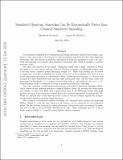Simulated Quantum Annealing Can Be Exponentially Faster Than Classical Simulated Annealing
Author(s)
Crosson, Elizabeth; Harrow, Aram W.
Download1601.03030.pdf (485.9Kb)
Terms of use
Metadata
Show full item recordAbstract
© 2016 IEEE. Can quantum computers solve optimization problems much more quickly than classical computers? One major piece of evidence for this proposition has been the fact that Quantum Annealing (QA) finds the minimum of some cost functions exponentially more quickly than classical Simulated Annealing (SA). One such cost function is the simple 'Hamming weight with a spike' function in which the input is an n-bit string and the objective function is simply the Hamming weight, plus a tall thin barrier centered around Hamming weight n/4. While the global minimum of this cost function can be found by inspection, it is also a plausible toy model of the sort of local minima that arise in real-world optimization problems. It was shown by Farhi, Goldstone and Gutmann that for this example SA takes exponential time and QA takes polynomial time, and the same result was generalized by Reichardt to include barriers with width and height scaling as positive powers of n such that the total area under the barrier is at most the square root of n. This advantage could be explained in terms of quantum-mechanical 'tunneling.' Our work considers a classical algorithm known as Simulated Quantum Annealing (SQA) which relates certain quantum systems to classical Markov chains. By proving that these chains mix rapidly, we show that SQA runs in polynomial time on the Hamming weight with spike problem in much of the parameter regime where QA achieves an exponential advantage over SA. While our analysis only covers this toy model, it can be seen as evidence against the prospect of exponential quantum speedup using tunneling. Our technical contributions include extending the canonical path method for analyzing Markov chains to cover the case when not all vertices can be connected by low-congestion paths. We also develop methods for taking advantage of warm starts and for relating the quantum state in QA to the probability distribution in SQA. These techniques may be of use in future studies of SQA or of rapidly mixing Markov chains in general.
Date issued
2016Department
Massachusetts Institute of Technology. Center for Theoretical Physics; Massachusetts Institute of Technology. Department of PhysicsJournal
2016 IEEE 57th Annual Symposium on Foundations of Computer Science (FOCS)
Publisher
Institute of Electrical and Electronics Engineers (IEEE)
Citation
Crosson, Elizabeth, and Aram W. Harrow. “Simulated Quantum Annealing Can Be Exponentially Faster Than Classical Simulated Annealing.” 2016 IEEE 57th Annual Symposium on Foundations of Computer Science (FOCS) (October 2016). doi:10.1109/focs.2016.81.
Version: Original manuscript
ISBN
978-1-5090-3933-3
Collections
The following license files are associated with this item: